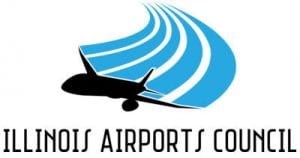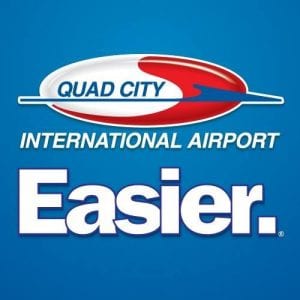Quad City Airport Director Leads New Illinois Airports Council
Benjamin Leischner, executive director of the Quad City International Airport, is chairman of the new Illinois Airports Council. He and other airport leaders are praising a proposed amendment to Illinois Aeronautics Act, legislation that defines the role of the Illinois Department of

Ben Leischner is also a licensed pilot.
Transportation when it comes to regulating aviation in the state of Illinois.
SB-1764 works to streamline how commercial service airports in the state of Illinois receive federal money awarded by the FAA to airports, better defines allowable use of state money for the construction of public aeronautical facilities and clarifies the role of the state regarding federal investment in commercial service airports.
“This amendment will clear the path for federal funds to go directly to the intended receiver, cutting down on wasteful practices, and increasing accountability and transparency about how federal dollars are rolled out and used in local communities,” Leischner said Tuesday.
“The way the Act is currently written creates an unnecessary level of bureaucracy at the state level that can be easily remedied with this amendment, which more closely follows federal guidance and best practices.”
Most recently, the CARES Act designated tens of millions of dollars to Illinois airports for emergency use. This was at a time when airports were experiencing anywhere from a 60 percent to over 90 percent decline in passengers resulting in major losses of revenue. While

Ben Leischner, executive director of the Q-C airport since May 2018, is chairman of the new Illinois Airports Council.
neighboring states received funds in a matter of days, Illinois airports waited nearly six months.
Last month, the Quad City Airport in Moline got a $2.8 million boost from the Federal Aviation Administration’s Airport Coronavirus Response Grant Program.
The program, funded under the Coronavirus Response and Relief Supplemental Appropriations Act of 2020 (CRRSA), awarded $2 billion total to U.S. airports. This funding will continue to offset lost revenue and provide operational and payroll support. The Q-C airport previously received $8 million from the CARES Act.
“As a facility that supports nearly 500 jobs, nearly 100 of which are employed directly by the Metropolitan Airport Authority, this funding ensures that we can continue to provide the level of service that we are known for while keeping the MAA workforce fully intact,” Leischner said last month.
“I want to thank our elected officials here in Illinois and at the federal level for their support of the transportation sector. Air travel is critical to our country’s infrastructure and here locally, the airport’s economic impact is more than $500 million per year,” he said. “This exceeded our expectations and we are thrilled.”
The Illinois Airports Council was founded in 2020, as a nonprofit corporation representing the aviation industry in the state, and led by Illinois airport executives.
Its goals include:
- The promotion and advancement of the interests of civil airports within the state of Illinois;
- To serve as a centralized platform in the exchange of information for airport operators;
- The identification and tracking of state legislation that pertains to airports; and
- Representation of airport operators through engagement with the Illinois Department of Transportation and the Division of Aeronautics in establishing and maintaining Best Management Practices for the application of State funds to the State Aviation System.
Airports receive annual grants from the FAA and other agencies to support infrastructure projects, including upgrades to equipment, and

The Illinois Airports Council was founded in 2020.
safety measures that align with the latest FAA requirements. Airports often wait months, and in some cases years, for the state to release the funding to begin the projects, and are met with roadblocks in how the money can be used that differs from the original intent.
“We want to thank our elected leaders who have supported it thus far and urge others to do the same,” Leischner said of the state Senate bill, introduced by Sen. Christopher Belt, and co-sponsored by Sens. Donald P. DeWitte, Neil Anderson, Steve McClure and David Koehler.
As the Q-C airport looks ahead to recovery, encouraging studies have emerged throughout the pandemic showing that air travel has some of the lowest rates of transmission, thanks to the

The Quad City International Airport saw a 56% drop in January passengers compared to the same month in 2020.
filtration systems on board aircraft, according to an airport release.
A study issued on Feb. 11 by Harvard’s Aviation Public Health Initiative also examined the detailed health and safety of airports and concluded that the probability of being infected at an airport is very low.
In January 2021, the Q-C airport saw a 56% decline in passengers compared to the same month in 2020. It was an improvement over December, “which we were fairly pleased with considering January is always the toughest month of the year for travel,” airport spokeswoman Ashleigh Johnston said Tuesday.
There were a total of 23,531 passengers through the Moline airport in January, compared to 54,033 in January 2020. Since the pandemic started, the busiest month for the airport was October, with 26,415 passengers, compared to 65,572 in October 2019.
Any general inquiries or interest in membership to the Illinois Airports Council can be directed to ILAirportsCouncil@gmail.com. For more information on the Q-C airport, visit www.qcairport.com.









